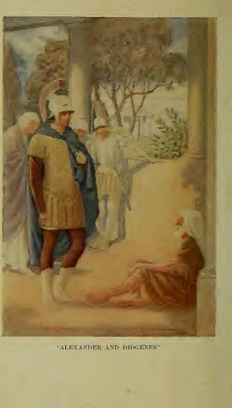
ALEXANDER THE GREAT PDF
Preview ALEXANDER THE GREAT
'ALEXANDER AND DIOGENES' ALEXANDER THE GREAT BY ADA RUSSELL, M.A. (Vict.) WithFrontispiecein ColorandEight Black-and-WhiteIllustrations NEWYORK FREDERICK A. STOKES COMPANY PUBLISHERS Copyright, 1914, h Frederick A. Stokes Company AllRightsReserved iim SEP August,1914. ©aA380350 Contents CKAPTEB PAGE I, The Old World 9 II. Philip II of Macedonia 25 III. Alexander as Prince 37 ... IV. Alexander in Thrace, Illyria, and Greece 49 V. The Conquest of Asia Minor 60 VI. Conquest of Syria and Phcbnicia 76 VII. Alexander in Egypt 88 VIII. The Conquest of Persia 96 IX. Alexander in Central Asia Ill X. The Conquest of the Punjab 125 XI. The Return to Susa 138 XII. The Last Two Years 152 XIII. Alexander's Characterand PlaceinHistory . . 172 XIV. The Alexandrian Empire 179 Illustrations Alexander and Diogenes Frontispiece '^ PAGE Alexander coercing the Delphic Oracle 52 " Alexander cutting the Gordian Knot 72 ^"^ The Fight about the Chariot op Darius at Issus . . 78"^' The Siege of Gaza 86 The Death of Darius 108 The Murder of Clitus 122 The Phalanx attacking the Centre on the Htdaspes 132 . The Death of Alexander 168 - MAP To Show Empire of Alexander the Great 190 CHAPTER I: The Old World IT is difficult to realize that the earth on which Alexander the Greatwasborn was the same in its main outlines as the earth on which we stand to-day, and at the same time to realize how very different from our present knowledge were men's ideas then of its area. Even modern writers picture Alexander as primitive in his notions, and it will be interesting to remember, when we find him anxious to press ever farther and farther east and south, that the philosophers of his time, espe- ciallyhisgreatteacherAristotle, hadjustannounced newargumentstoprovethattheearthwasspherical in form. The old Homeric ideas that the earth was aflatdisk, thatthebronzefirmament, setwithstars, was upheld on great pillars by Atlas, and that the sun(asHerodotusimagined)couldbeblownoutofits coursebyastrongwind,hadpassedawayforever. Among the earliest peoples to travel about the sea were the Phoenicians, a Semitic race akinto the Jews, and the greatest trading and maritime race of antiquity. They ventured far in search of the rich merchandise which they brought back to their cities of Tyre and Sidon on the coast of Syria, to Carthage on the north coast of Africa, and to their othersettlementsatallquartersoftheMediterranean. They are believed to have learned the alphabet and other arts from their customers the Egyptians, and to have been the teachers of the Greeks in these matters. The Phoenicians told nobody of the geo- graphical knowledge which they acquired in their wanderings, as they were anxious to keep a trading 9 Alexander the Great monopoly. They rounded the coast of Spain by the 'Pillars of Hercules' at a very early date, sailed through the Bay of Biscay, established trade with Britain, and perhaps even fetched amber from the shores of the Baltic. When the Greeks, however, first began to launch their merchantmen the Phoenicians assured them that the Pillars of Hercules stood at the western end of the earth, and probably many of the legends which make early Greek geography so picturesque were invented by those wily adventurers in order to discourage the Greeks from following in their steps. Thus the Greeks of the early fifth centuryB.C. believed that the ArabianfrankincensebroughtbythePhoenicians wasguardedbydragons, andthatscreeching, winged animals sought to peck out theeyesoftheArabians who, clad in stout armour, gathered cassia by the shoresofaremotelake. Cinnamonwassupposedto begotby artful devicesfromthenestsofbirdsonan unscaleable precipice; and gold, the story ran, was stolen by the one-eyed Arimaspi from the griffins. The Persians, who dazzled Greek eyes with their quantitiesofgold,toldtheGreeksthatitwasobtained by Indians at the peril of their lives; they were pursued, as they gathered the gold-dust, by ants somewhat smaller than dogs but bigger than foxes andswifterthananyotheranimalonearth. Manyof theselegendshadbecome discreditedbyAlexander's time, but it was owing to his travels that they passed for ever out of the realm of geography into that of myth, as far as the ancients were concerned. TheGreeks,unlikethePhoenicians,tookaPlatonic interest in geography, and before they had many The Old World facts to go upon commenced to make maps of the world. More than that, they began to have ideas about the universe. Anaximander, who made the first map early in the sixth centuryB.C., declared his belief that the earth swung in the sky hke the planets. He does not seem to have taught that it was spherical in shape, but later on in thatcentury Pythagoras made as great a stir as did Copernicus more than two thousand years later, by declaring that the earth revolved round some great central fire in the heavens, and that it was itself a globe. These were only good guesses, and very few people could accept the curious, mystical reasons which Pythagoras gave for his opinions; but the philoso- phers of the fourth century approved of thetheory ofsphericityandfoundgoodreasonsforit. Aristotle, who possessed one of the most scientific brains ever given to a mortal, said that the phenomenon of gravitation would make the earth spherical, and pointed to the fact that the shadow cast by the earth on the moon in an eclipse was invariably circular in shape. Alexander, who had more than thenormalGreekgeographicalcuriosity,cannothave failed to know Aristotle's views. Before Alexander lived the Greeks considered Delphi, where the shrine of Apollo stood, as the centre of the earth's surface. Two eagles, the story ran, released byZeus atthe edgesoftheeasternand western oceans, had flown until they met at Delphi, where a stone, still in themuseum there, wasknown as the 'navel of the earth.' The Greeks originally divided the earth into the two continents of Asia (including Africa), the land of the sunrise, and
